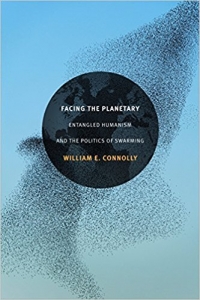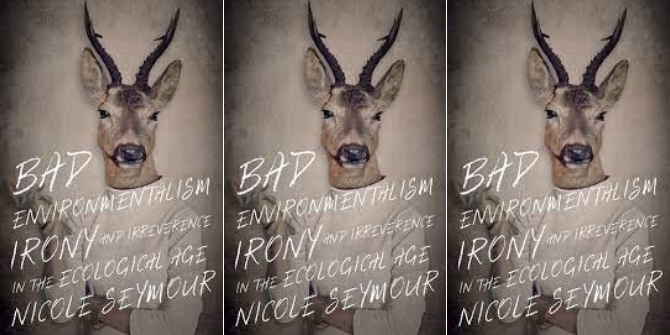In Facing the Planetary: Entangled Humanism and the Politics of Swarming, William E. Connolly addresses deepening planetary crises by exploring the creative potential of a ‘politics of swarming’. In calling for an ‘entangled humanism’ to construct a radical, pluralist assemblage able to tackle our present ecological predicament, this invigorating and imaginative book merits attention, writes Nikhilendu Deb.
Facing the Planetary: Entangled Humanism and the Politics of Swarming. William E. Connolly. Duke University Press. 2017.
Find this book (affiliate link): ![]()
 In Facing the Planetary: Entangled Humanism and the Politics of Swarming, William E. Connolly focuses on deepening planetary crises, including climate change, and the existing, inadequate responses to these by political, social and economic actors, before outlining a politics necessary to defuse this situation. To illustrate how official narratives lurch from one crisis to another in the absence of a reliable alternative, Connolly uses a metaphor from the Book of Job, where Job suffers without any misdeeds of his own, yet is pressed to continue and even intensify his belief in a ‘higher purpose’. Mythological stories have become revelatory in understanding how a prevailing system reacts to crises, which is, as Connolly writes, evident in neoliberalism’s response: intensification of support for its ideology.
In Facing the Planetary: Entangled Humanism and the Politics of Swarming, William E. Connolly focuses on deepening planetary crises, including climate change, and the existing, inadequate responses to these by political, social and economic actors, before outlining a politics necessary to defuse this situation. To illustrate how official narratives lurch from one crisis to another in the absence of a reliable alternative, Connolly uses a metaphor from the Book of Job, where Job suffers without any misdeeds of his own, yet is pressed to continue and even intensify his belief in a ‘higher purpose’. Mythological stories have become revelatory in understanding how a prevailing system reacts to crises, which is, as Connolly writes, evident in neoliberalism’s response: intensification of support for its ideology.
Connolly provokes our social and ecological imagination vis-à-vis anthropogenic ecological change by attending to several ‘force fields’ such as climate patterns, drought regions, the ocean system, species evolution, glacier currents and catastrophic hurricanes. He concludes the book with a convincing argument in favour of ‘entangled humanism’, challenging sociocentrism, on the one hand, and forging relations of reverence with multiple traditions around the world on the other.
In the first chapter, Connolly critically engages with many leading works of ‘sociocentrism’, by which scholars display a penchant toward explaining social processes solely through reference to other social processes. Even the best sociocentric scholars do not attend to the ‘self-organizing amplifiers and internal volatilities of planetary processes’ (16). Sociocentrism is also associated with human exceptionalism, which deems humans as the only capable agents in the world. Although a sociocentric propensity is noticeable in the work of many Western scholars, Connolly tours four key figures in this tradition: Jean-Jacques Rousseau, Isaiah Berlin, Friedrich Hayek and Karl Marx. To Connolly, all failed to underline how Western capitalist states and imperial orders created, and would continue creating, a world climate and ecological crisis that particularly affects poor and minority populations across the world.
 Image Credit: ‘Enxame’ by Ricardo Reis licensed under CC BY SA 2.0
Image Credit: ‘Enxame’ by Ricardo Reis licensed under CC BY SA 2.0
In Chapters Two and Three, Connolly extends his dialogues to recent theories of species evolution and cultural theorists, respectively. In Chapter Two, he underscores the need to exchange ideas between the work of contemporary earth scientists and those in the social sciences and humanities. He pursues this in the next chapter by inviting scholars to engender a ‘critical politics’ necessary for dealing with the problems that are staring the world in its face. In Chapter Four, Connolly presents a history of how rapid changes in planetary forces, i.e. to glaciers, the climate and oceans, proceeded in the past (91), and how unbridled capitalist growth has triggered off a series of planetary-level, environmental crises.
In Chapter Five on the politics of swarming, Connolly addresses the democratic process and capitalism as they coexist today, emphasising the dilemmas of electoral politics, especially in the United States. The unchecked power of corporations, the media’s focus on insignificant or scandalous issues, gerrymandering and filibustering of the state and actions to disenfranchise minority populations all make electoral politics dysfunctional. However, Connolly suggests that we partake in electoral politics as well as break its ‘grid of intelligibility’ (123). Otherwise, actors of the political Right will utilise yet another institution to consolidate its agenda in this era replete with extremist potential.
Additionally, electoral politics render invisible the extractionist mission of capitalism, which imposes sufferings on ‘those who cannot easily publicize widely what is happening to them as they suffer effects of corporate invasions in long slow time’ (123). The question is: do we just stand idle in an epoch when problems are multiplying and solutions seem ineffective? To answer this question, Connolly cites Thomas D. Seeley’s metaphor of ‘honeybee democracy’. Here, female scouts check out possible relocation sites in the search for a new hive site, and each returns and suggests the attractiveness and feasibility of a new location. Other bees scout the location, gradually building a quorum upon the negotiation of multiple sites identified by secondary and tertiary scouts before the decision to move is made (124). To Connolly, such types of assembly-based swarming movements, having a variety of loci and foci of choices, may provide a promising clue in our search for planetary solutions. Connolly suggests that humans can also take experimental roles in numerous locations with diverse foci to ‘swarm’ regular politics: therefore, the politics of swarming ‘is composed of multiple constituencies, regions, levels, and modes of action, each carrying some potential to augment and intensify the others with which it becomes associated’ (125).
Connolly next discusses the potentiality of a ‘general strike’, drawing on scholars and activists such as Georges Sorel and Mahatma Gandhi. Sorel, for instance, discussed two different types of strikes: Local and General. The former is specific to short-term objectives, such as better working conditions, and the latter aims to demand a fundamental reordering of the world. Connolly, however, raises the caveat that a slow-motion strike alone may be insufficient. Thus, to affect the trajectory of contemporary politics, we also need to mobilise a ‘militant pluralist assemblage’ drawing from different classes, religions, creeds, age cohorts and genders (131). Moreover, although Connolly suggests the need for militant action, it must be strategic enough to avoid violence, in the manner of Gandhi in colonised India.
Connolly begins the last chapter with Rob Nixon’s notion of ‘slow violence’, a notion that adequately captures capitalism’s violence against the environment which takes place gradually and happens out of our sight. The Bhopal disaster of 1984 would be an example of slow violence because it is remembered only by its spectacle: thousands of casualties, whereas other hundreds of thousands suffered many long-lasting consequences, and the soil and groundwater remain contaminated to date.
Here, instead of being a passive nihilist, Connolly extols the notion of an entangled humanism, which encourages us to: 1) see symbiotic relationships between human species and other beings and forces; 2) revise the doctrines of human exceptionalism and sociocentrism and become more aware of other modes of experiences; 3) forge relations of respect across societies such as towards the traditions of indigenous groups; and 4) form a critical pluralist politics exceeding creedal differences which ‘pursues ecological actions at multiple sites’ (172) and simultaneously seeks to weaken its opponent in this perilous period. Finally, Connolly invites us to engage in an energetic cross-regional pluralist assemblage consisting of numerous minorities as opposed to decisions being taken from the centre.
To conclude, it seems there is no good omen for the future of this planet. Although the world continues to face catastrophic weather events and climate change appears to be leading towards the world’s sixth great mass extinction, the dominant political and economic systems seem resistant to addressing these planetary crises adequately. Given this situation, Connolly’s analysis of planetary calamities and proposal for a politics of swarming merit attention. The book effectively integrates a variety of sources, including from political theory, social theory, philosophy, theology, economics, geology, biology and paleontology, and covers a wide range of topics, reinvigorating discussion regarding not only the current ecological problems, but also what can be done given the prospect of a seemingly apocalyptic future.
Note: This review gives the views of the author, and not the position of the LSE Review of Books blog, or of the London School of Economics. The LSE RB blog may receive a small commission if you choose to make a purchase through the above Amazon affiliate link. This is entirely independent of the coverage of the book on LSE Review of Books.








1 Comments